As a Russian tortoise owner or enthusiast, it is vital to understand the dietary needs of these fascinating reptiles. This article will provide an in-depth look at the role apples can play in the diet of Russian tortoises, while also touching upon their overall nutritional requirements and the importance of leafy greens.
Russian Tortoise Dietary Basics
When it comes to feeding a Russian tortoise, the key to its health lies in providing a well-balanced and varied diet. These tortoises naturally thrive on diets that are primarily herbivorous, consisting largely of leafy greens and other vegetables. In the wild, they are typically found grazing on various plants, grasses, and flowers. Hence, it is vital to replicate this natural feeding behavior by offering an assortment of fresh greens and vegetables to encourage healthy growth and development.
Leafy greens should comprise an essential part of a Russian tortoise’s diet, as they are packed with essential minerals and vitamins. Some of the best choices include dandelion greens, collard greens, mustard greens, and turnip greens. These should be provided in combination with other vegetables such as bell peppers, squash, and carrots, which will add variety and ensure the tortoise receives optimum nutrition. Fruit, on the other hand, should only be offered sparingly. While small quantities of fruits like apples may be provided occasionally, they should not form a substantial part of the tortoise’s diet. Apples contain natural sugars that, when consumed in excess, can lead to digestive issues and health problems for the tortoise.
Providing a healthy and balanced diet for Russian tortoises is essential for their well-being, including a mix of leafy greens, vegetables, and calcium supplementation. Cuttlebone or calcium-dusted food can help maintain a balanced calcium-to-phosphorus ratio, which is important for strong bone and shell growth. Monitoring your tortoise’s eating habits to ensure they’re receiving enough nutrition and maintaining a healthy weight is key. Always make sure to have clean, fresh water available for your tortoise to stay properly hydrated. By adhering to the specific nutritional requirements of Russian tortoises, you can ensure a happy and healthy life for your pet.
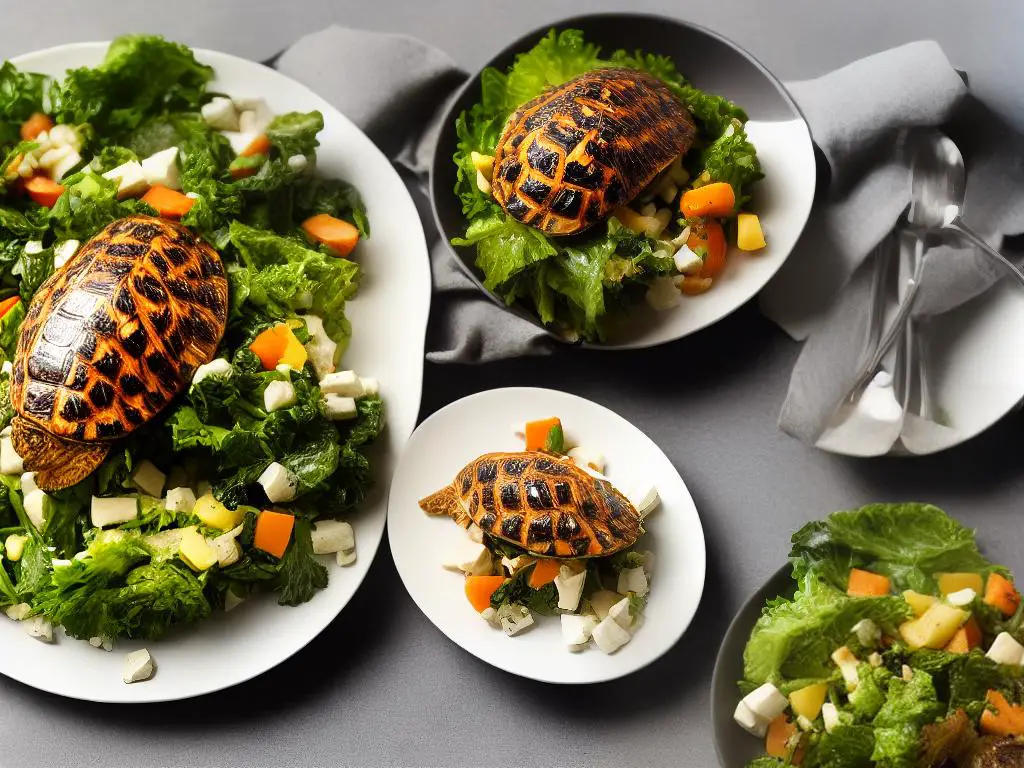
Apples as a Food Source
One popular fruit that people often wonder about when it comes to Russian tortoise diets is the apple. This widely available fruit is rich in vitamins and minerals like vitamin C, potassium, and fiber. Introducing apples or other fruits as an occasional treat can add some variety to a Russian tortoise’s diet, supplementing their core diet of leafy greens and vegetables with additional nutrients. However, fruits should be offered in moderation to ensure a balanced and nutritious diet for your tortoise.
However, it’s important to keep in mind that Russian tortoises are primarily herbivorous, meaning their digestive systems are designed to break down fibrous plants. While apples can be a tasty treat for these reptiles, too much fruit in their diet can lead to digestive issues over time. As a result, apples and other fruits should be offered to Russian tortoises in moderation and should not replace their core diet.It is important to note that not all fruits are safe for consumption by Russian tortoises. They should avoid fruits with high sugar or acidic content, as well as fruits with large seeds or pits that might be a choking hazard. Before introducing apples or any other type of fruit to your Russian tortoise’s diet, consult with your veterinarian to confirm the safety and appropriateness of these foods for your reptile’s dietary needs. By ensuring a properly balanced diet, you can help keep your tortoise healthy and happy.
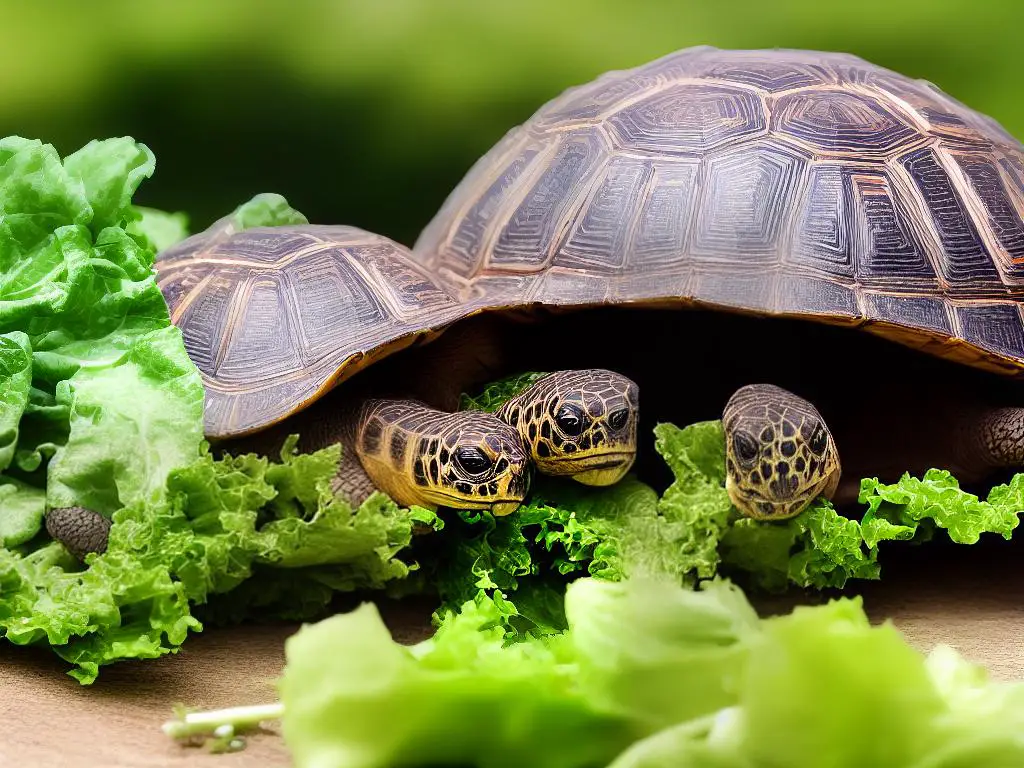
Pros and Cons of Feeding Apples
Feeding apples to Russian tortoises has its benefits, as these fruits provide a good source of important nutrients such as vitamins A, C, and K, along with dietary fiber. Since these tortoises are primarily herbivorous, offering them a varied and balanced diet, including fruits like apples, can improve their overall health and vitality. Moreover, apples can serve as an occasional treat that can provide stimulation and enrichment to the tortoise, encouraging them to chew, savor, and explore the taste and texture.However, there are some disadvantages to feeding apples to Russian tortoises. Apples are relatively high in sugars and can lead to weight gain or obesity if fed too frequently or in large quantities. Excess sugar can also cause gastrointestinal issues in tortoises, such as diarrhea or constipation, and negatively impact their overall health. Furthermore, the seeds found in apples contain trace amounts of cyanide, which can be toxic to tortoises if ingested in large quantities. It is essential to remove the seeds before offering any pieces of apple to the tortoise to prevent any potential health risks.In order to safely and effectively incorporate apples into a Russian tortoise’s diet, it is essential to practice moderation and proper feeding methods. Apples should only be fed to the tortoise as an occasional treat rather than a staple food item, to prevent any adverse effects associated with high sugar content or potential toxicity from apple seeds. When offering apples, make sure they are washed, peeled, seeds removed, and cut into small, manageable pieces for the tortoise to consume. Additionally, it is important that the tortoise’s diet consists of a variety of leafy greens, vegetables, and edible plants to maintain optimal health and well-being.
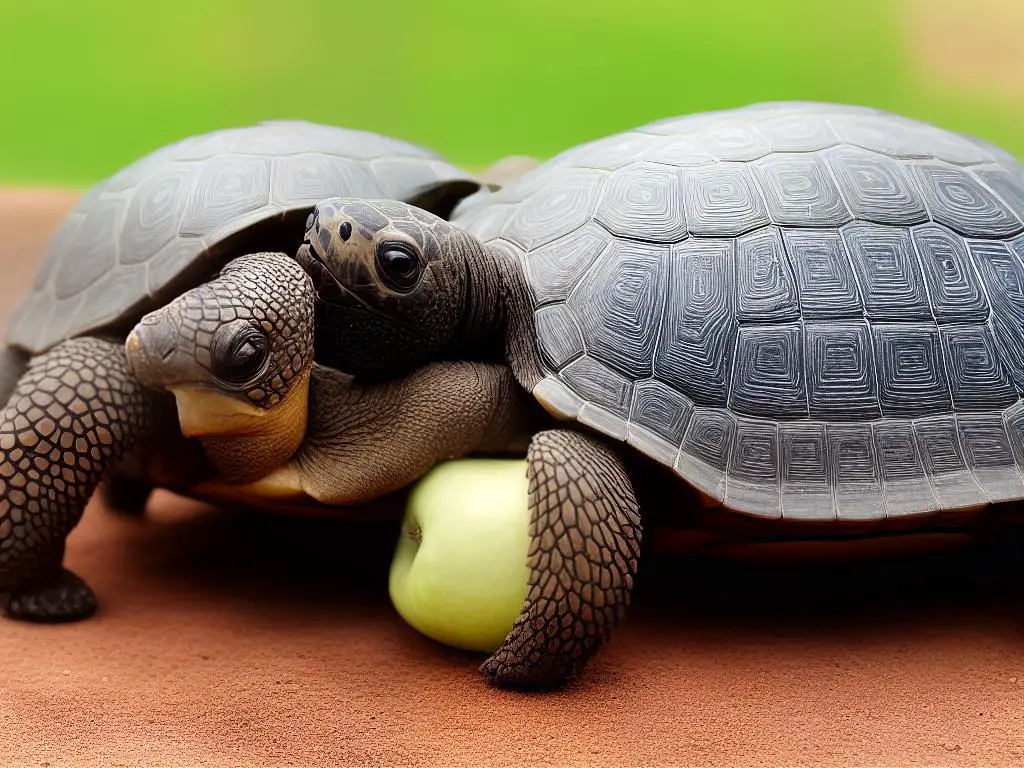
Alternative Fruits and Treats
Russian tortoises (Testudo horsfieldii) are primarily herbivorous creatures, consuming a diet that mainly consists of leafy greens and vegetables. Although apples and other fruits can be given as occasional treats, it is essential to understand that these food items should not make up the majority of their diet. Including a variety of other healthy fruits such as melons, berries, and stone fruits can be beneficial, but it is always advised to provide these treats in moderation. A well-balanced meal plan, along with a calcium supplement, is vital in maintaining good health and shell condition for your pet tortoise.
In addition to apples, Russian tortoises can also enjoy fruits like apricots, peaches, pears, plums, and strawberries. However, it is necessary to ensure that these fruits are given as an occasional treat, not exceeding 10% of their overall diet. Their primary nutrition should come from dark, leafy greens such as dandelion, kale, and collard greens, as well as grasses. Paying attention to a balanced calcium-to-phosphorus ratio is crucial in providing adequate nutrition for your tortoise.
A Russian tortoise’s diet typically should consist mainly of leafy greens and vegetables, but can be complemented with occasional treats such as flowers, edible plants, and fruits like apples. They enjoy flowers such as rose petals, hibiscus, and nasturtiums. Additionally, they can eat herbs like basil, cilantro, and mint. Remember to thoroughly wash all fruit, plants, and flowers before feeding them to your tortoise, and avoid giving foods high in oxalates or goitrogens, which can contribute to health issues. Offering a diverse and well-rounded meal plan will contribute to your Russian tortoise’s overall health and well-being.
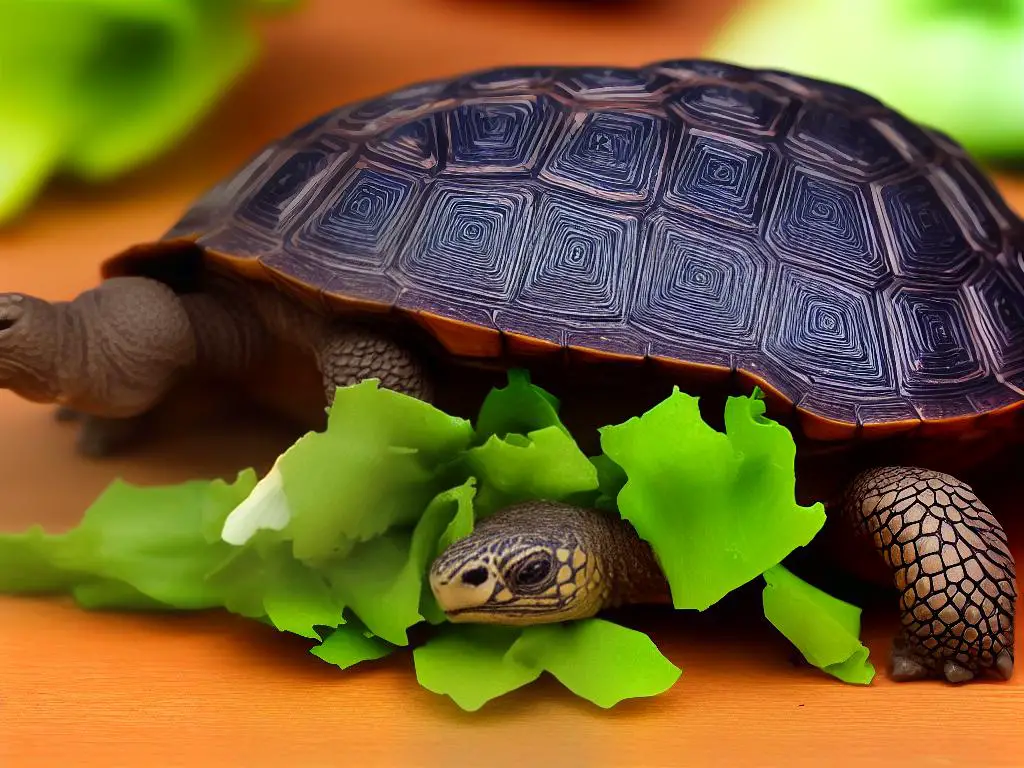
Expert Opinions and Recommendations
Expert opinions and recommendations on the topic of Russian tortoises consuming apples and other fruits tend to vary. While some experts suggest that tortoises can enjoy fruits as an occasional treat, others emphasize the importance of maintaining a more herbivorous diet for a Russian tortoise’s overall health. As a pet owner, it is crucial to understand the best practices in caring for these reptiles, since their dietary needs are quite specific. Ensuring a balanced diet that is mostly focused on leafy greens and vegetables will greatly contribute to the health and happiness of your Russian tortoise.
Apples can be given to Russian tortoises in moderation, but they should not be a staple of their diet. Fruits are typically higher in sugar, which can lead to obesity for the tortoise over time. Additionally, too much fruit intake can create an imbalance in their digestive system and lead to health issues. The Tortoise Trust, a leading international organization on tortoise care, suggests offering fruits as only an occasional treat, while focusing primarily on a diet of leafy greens, vegetables, and edible weeds.It is essential for Russian tortoise owners to provide a diverse range of foods, ensuring that their pet receives the necessary nutrients to maintain proper health. The primary focus should be on providing various leafy greens, such as dandelion, endive, and escarole, as the main source of nutrition for the tortoise. Some experts also recommend supplementing the diet with calcium and vitamin D3 to promote bone health. In general, it is best to limit fruit consumption, including apples, to maintain a healthy balance in the tortoise’s diet. Careful monitoring of their pet’s nutritional intake will ensure the overall health and well-being of a Russian tortoise.
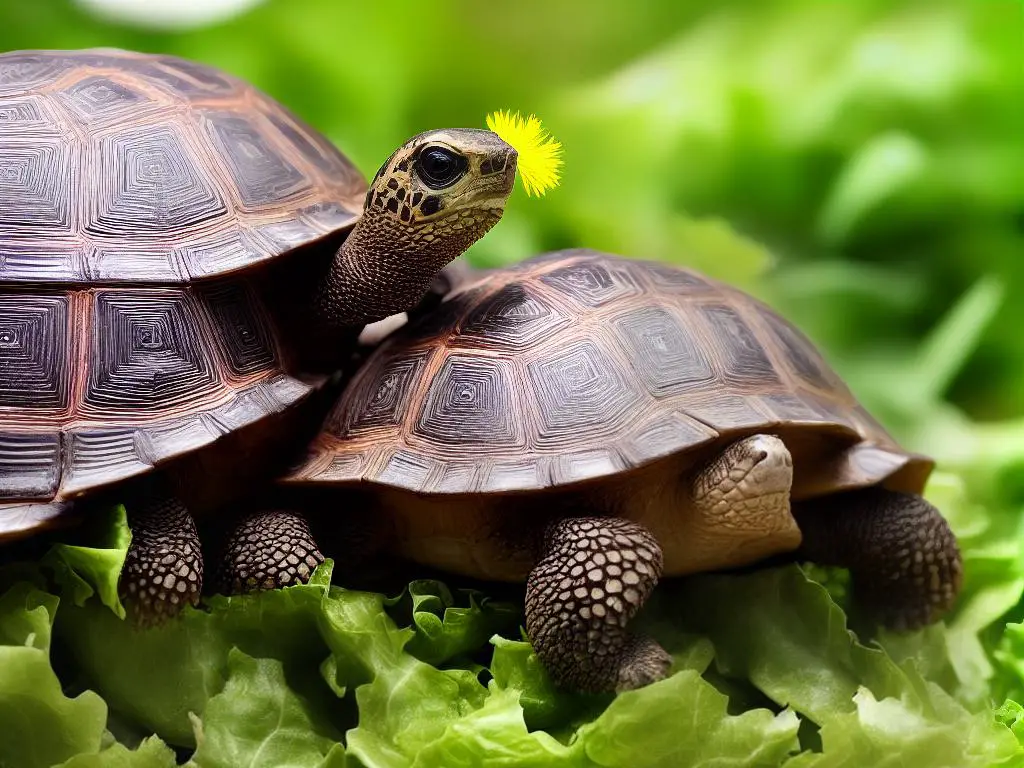
Through understanding the pros and cons of feeding apples to Russian tortoises, caregivers can make informed decisions about their reptile’s diet. Remember to prioritize leafy greens and other nutritionally rich foods, while offering fruits like apples and other recommended alternatives in moderation. Always consult professional resources and expertise to ensure the health and well-being of your Russian tortoise.